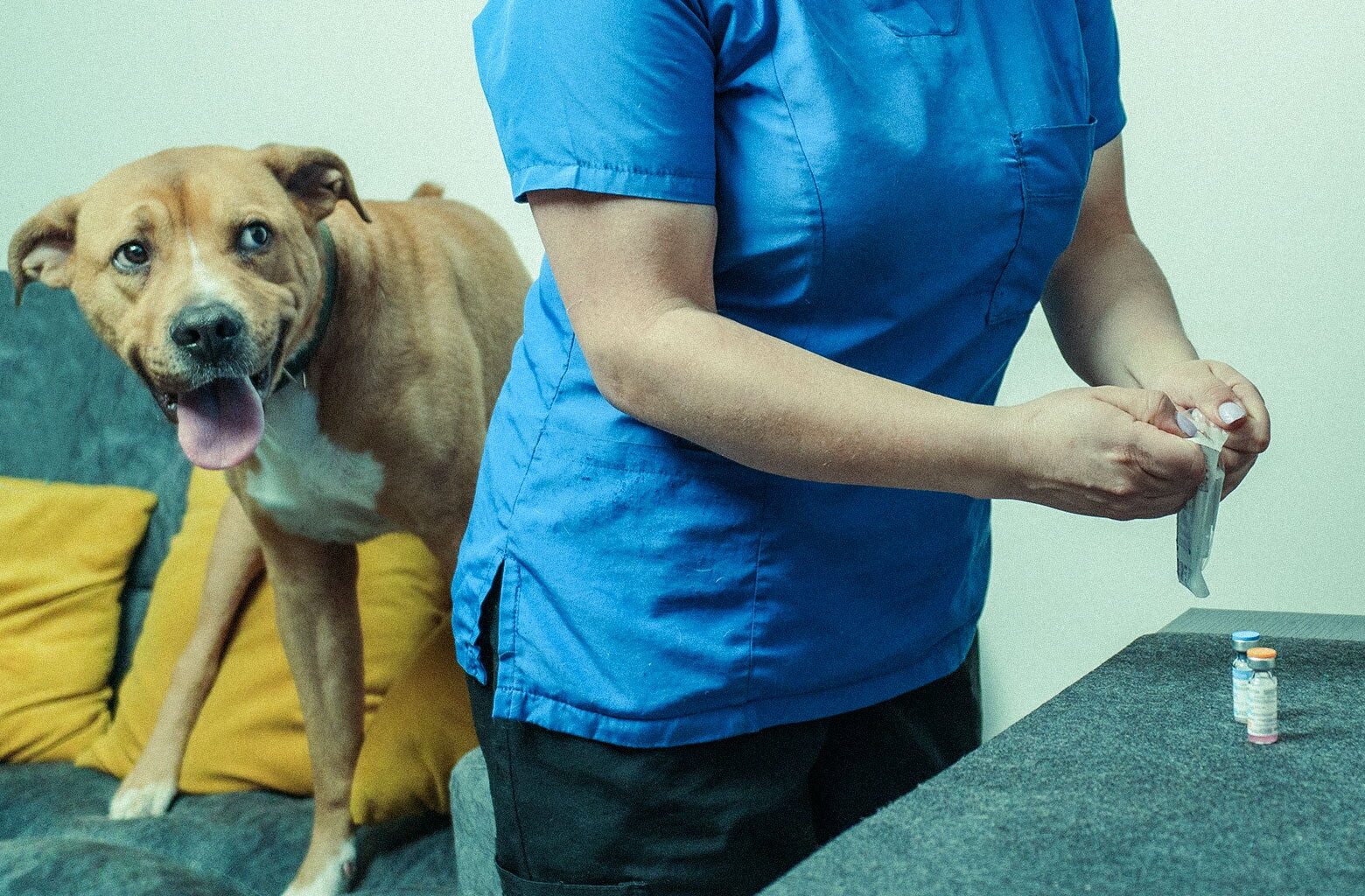Sign up for the Slatest to get the most insightful analysis, criticism, and advice out there, delivered to your inbox daily.
About eight years ago, Grant decided he would never vaccinate his dogs again. A former Army medic, the Santa Barbara, California, resident had always given his pets whatever the veterinarian recommended, including shots for rabies and parvo. But after training as a bodyworker and practitioner of Traditional Chinese Medicine, he started to question the utility of the preventive measures.
Influenced by the tenets of TCM and a book he read on the unethical practices of rabies vaccine pioneer Louis Pasteur, Grant became skeptical that the collection of symptoms identified by veterinarians as rabies was an actual, distinct disease that could be targeted by an injectable drug. Though he distrusts pharmaceutical products, potential adverse effects aren’t his major objection to the shots. “It’s more about not being convinced at all that there’s really anything to vaccinate against,” he said.
Though health authorities adamantly agree that rabies is a real virus, Grant is far from alone in his skepticism about vaccines. In a 2023 survey of American dog owners published in the journal Vaccine, 30 percent deemed dog vaccines medically unnecessary, 22 percent called them ineffective, and 37 percent worried that they could cause autism in their pets. A small majority expressed at least one of these three positions, exhibiting what the researchers called a concerning degree of vaccine hesitancy.
Studies and anecdotal reports have documented vaccine skepticism among pet owners around the world for years. In 2017, a Brooklyn Paper article declared that veterinarians in the New York borough were hearing clients express concerns about routine shots. According to a report from an animal welfare organization in the U.K., just 66 percent of cat, dog, and rabbit owners said in 2019 that their pet was vaccinated while young, compared to 84 percent in 2016. Veterinarians emphasize that vaccine-hesitant pet owners have good intentions and only want their pets to be well; the American Veterinary Medical Association, which did not return a request for comment, has published advice for vets who must promote vaccination to skeptical clients.
But opposition to pet vaccines seems to have risen since the COVID-19 pandemic. Experts say that since contemporary pet owners view their animal companions as family members, attitudes toward veterinary treatments mirror attitudes toward human medical interventions. The Vaccine journal study found that people with negative views of human vaccines were likelier to have negative opinions of animal vaccines—and COVID-19 had a lasting impact on the way people feel about preventative shots. In a series of Gallup polls, the percentage of Americans who said it was extremely or very important for parents to vaccinate their children dropped 15 points between 2020 and 2024, a decline the poll attributed almost entirely to right-leaning Americans. A survey conducted in Brazil found that pet owners were six times more likely to refrain from vaccinating their animals if they themselves were not fully vaccinated against COVID-19.
Anti-vaccine advocates save their strongest rebukes for mRNA pet vaccines, the first of which were approved by the U.S. Department of Agriculture for canine influenza and feline leukemia last year. The menu of veterinary mRNA vaccines may soon expand; in Canada, pets can already get one for rabies. Because the two most famous and effective COVID-19 vaccines—Pfizer’s and Moderna’s—were the first-ever mRNA products to receive Food and Drug Administration approval, mRNA technology has become a primary villain of the anti-vaccine movement in both human and animal medicine.
Just as the alleged connection between human vaccines and autism has been thoroughly, repeatedly debunked, there is no evidence that pet vaccines are responsible for the ills with which anti-vaccine advocates credit them, from early-onset cancers to a suite of cognitive and behavioral problems that some half-jokingly call “pawtism.” Like autism in humans, “pawtism” is allegedly characterized by repetitive behaviors, sensitivity to sensory stimuli, and difficulty in social situations.
The lack of scientific backing for these vaccine concerns hasn’t stopped a multitude of influencers, care providers, and activists from raising alarm about veterinary shots. There are peddlers of tonics that claim to heal pets from the effects of “toxic preventatives and pharmaceuticals.” There are podcasters trumpeting “the risks of over-vaccination.” There are social media personalities posting scary videos about pet vaccines “shedding” onto humans.
Among conventional veterinarians, there is no recognized diagnosis of animal autism. But some alternative practitioners insist that it is a real condition, sometimes caused by vaccines. Caroline Wilkinson, a dog trainer in the U.K., said she first learned about the possibility through the teachings of a holistic veterinarian. (Wilkinson is not a veterinarian.) She became convinced that it was a real phenomenon after seeing an increase in “fear-based behaviors” among puppies after their first shots, which she claims to have reversed with essential oil therapy. “It could be argued that these fear-based behaviors came as part of the developmental stages of puppyhood,” she said—but the speed with which the puppies recovered “indicates to me that the chemical load of the vaccine was responsible.”
Many of the people and organizations decrying pet vaccines are the same ones fueling skepticism of human vaccines. Children’s Health Defense, a prominent anti-vaccine advocacy group founded by Health and Human Services Secretary Robert F. Kennedy Jr., published a book last year about “the dangers of over-vaccination” in veterinary medicine. A recent video posted by the organization featured holistic veterinarian Judy Jasek, who claimed that the “toxicity” of vaccines is causing cancer in young pets. “We know they’re not testing this stuff,” she said in the video, calling the vaccine manufacturers “the same big pharmaceutical companies that are doing their shenanigans with people.” (While shots can, on rare occasions, cause tumors at the injection site in cats, there is no evidence that vaccines are responsible for other types of pet cancers.)
Jasek, who sees clients via telemedicine from her base in Tennessee, told me she started her career as a conventional veterinarian. About a decade into her practice, she began having doubts that the vaccines she delivered to animals were safe or necessary. Her suspicions were not based on any available medical literature. “Is there a formal, quote-unquote ‘research study’? No,” she said in an interview. “Nobody’s going to do research that shows that vaccines are toxic and bad, because there’s so much money made in the vaccine industry.”
Instead, Jasek drew her conclusions from her own observations and discussions with other “holistically-minded” colleagues. She decided to transition to a different kind of veterinary practice, replacing pharmaceutical products with herbs and homeopathic remedies. She counseled her clients on vaccinating their pets less, if at all. But “rabies is really hard to get around, because of the laws,” she said. The rabies vaccine is legally required for domestic canines in most U.S. states, including Colorado, where Jasek was practicing.
Like more than a dozen other states, Colorado offered a loophole for medical exemptions. If she could argue that a pet was not healthy in any way, Jasek would write up a note excusing the animal from the rabies vaccine. Most of the time it worked fine, but she says she was twice contacted by the state board because people had filed complaints against her. (The complaints never led to any disciplinary proceedings.) Once, it was another veterinarian who didn’t believe an exemption was justified. Another time, a client’s unvaccinated dog bit someone.
“She kind of threw me under the bus, basically, and said, ‘Well, Dr. Judy said I don’t need the vaccines,’ ” Jasek told me. “That isn’t true. I mean, I tell people that the vaccines can cause health concerns. However, when it comes to the laws and the rules, people still have to be accountable.”
Rabies outbreaks in wildlife populations are on the rise across the U.S., due in part to human incursion on natural habitats. Though the people who have died from rabies exposure in the last year have gotten the disease from wild animals, veterinarians worry that distrust of pet vaccinations could lead to a resurgence among domestic animals of a virus that is nearly 100 percent fatal in both animals and people.

Andrew Bullis
I Never Understood Why Veterinarians Are at Such High Risk of Suicide. Until I Became One.
Read More
-
She’s Been Booted Out of Hollywood and Investigated by the Secret Service. When She Let Me Into Her House, I Could See Why.
-
One Consequence of the Government Shutdown Could Be Felt for Decades
-
Why Do So Many People Seem to Think J.D. Vance Is About to Replace Usha Vance? Glad You Asked.
-
This Content is Available for Slate Plus members onlyIt’s the Worst Thing You Can Do in Public. I Tried It for a Week.
People whose pets aren’t vaccinated for rabies may have difficulty finding a groomer or a place to board their dogs and cats, and they won’t be able to take international flights with their pets. Grant can’t license his dogs, as Santa Barbara regulations require, because one has never been vaccinated and the other hasn’t had one since his initial puppy shots. (For this reason, Grant requested a pseudonym as a condition of our interview.) “As a practitioner myself, boy, it would sure be nice if local and state and federal governments would force people by law to consume my product,” he said. Rabies vaccine mandates are “kind of the definition of fascism, where government and corporations have merged, and now it’s claimed that it’s science—it’s scientific, so therefore it’s public health.”
Grant does not take his beloved dogs to a veterinarian. He handles their medical care himself, using natural products and bodywork techniques. Recently, hoping to rid Grant’s dog Pilgrim (also a pseudonym) of a flea problem, a family member gave Pilgrim a pharmaceutical flea medication. According to Grant, the drug knocked Pilgrim out for the better part of four days. Grant massaged the muscles around his vital organs, which seemed to help Pilgrim regain the ability to stand up and urinate. As for the fleas, Grant will stick to using natural shampoos and brushing Pilgrim more often, even if it’s a partial, temporary fix. And he’ll take his chances without vaccines.
“We want to manage all of our problems and get rid of all of our problems. But is that actually scientific? Is it actually possible?” Grant said. “We have to accept, to an extent, that life isn’t perfect.”

Sign up for Slate’s evening newsletter.
